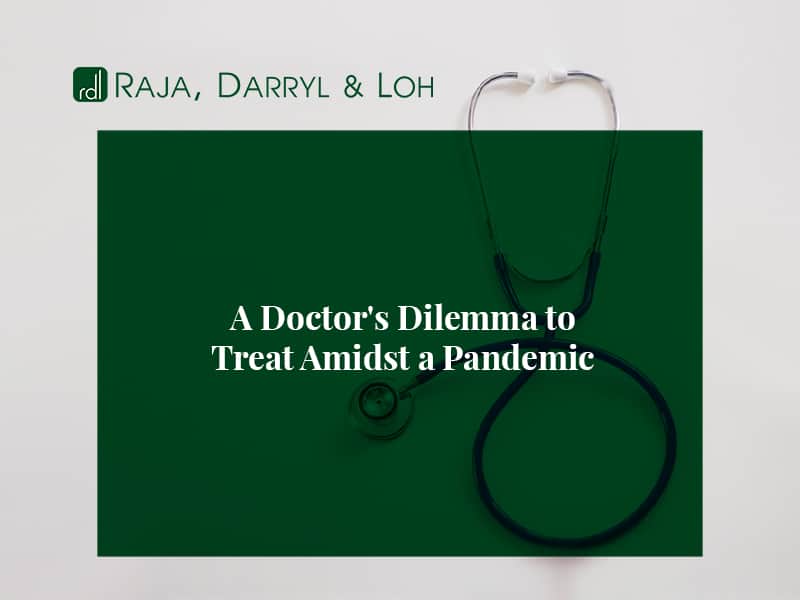As the new Covid-19 pandemic sweeps across the globe and people of numerous nations take to their homes in an effort to avoid spreading the contagion, it is no surprise that much of the conversation and news in respect of the pandemic is taking place online. People are utilising social platforms and news media to disseminate information, air their views and bide time while they, in netizen terms, #dudukrumah (stay at home).
Among the trending topics hitherto are reports of the increasing number of healthcare providers who have tested positive for Covid-19 or have been required to be quarantined following exposure to patients infected with Covid-19. Infected healthcare providers add another element of strain on the system and on public worries.
Currently, our government hospitals are operating at near maximum capacity and, in order to spread the load, the MOH announced a collaborative initiative with private entities for the collection of Covid-19 screenings from homes through the uberisation of healthcare. In addition to such services, members of the public may also be screened and tested in private healthcare facilities.
In conjunction with these developments and in the light of the highly contagious nature of Covid-19, a question that is posed by healthcare providers, particularly those in private practice, is whether a healthcare provider in a private healthcare facility may refuse to treat an individual for any ailment unless that individual undergoes screening for the virus and has a negative result. Put another way, can a healthcare provider compel an individual to be tested for Covid-19 prior to providing treatment?
As a general rule, there is no obligation on a healthcare provider to treat an individual unless it is to provide continued care to an existing patient or it is a life-saving emergency.
The Good Medical Practice 2019, which was adopted by the Malaysian Medical Council on 18th June 2019, states that in cases of emergencies, “professional, ethical and humane considerations dictate that doctors render emergency or lifesaving treatment to patients irrespective of their social and financial status or suspicion of being afflicted with serious communicable diseases (when standard or universal precautions should be taken by the doctor and his [or her] staff)”. Good medical practice in such situations involves, among others, offering assistance in an emergency that takes into account the healthcare provider’s own safety, his/her skills, the availability of other options and continuing to provide assistance until his/her services are no longer required. Ideally, even in emergency situations, standard precautions should be taken to minimise the risk of infection.
A medical emergency is defined in the Malaysian Medical Council Guidelines: Consent for Treatment of Patients by Registered Medical Practitioners as “an injury or illness that is acute and poses an immediate risk to a person’s life or long term health”.
The English Court of Appeal in Re T (adult: refusal of medical treatment) [1992] 4 All ER 649, described a medical emergency as circumstances in which “a potentially life threatening situation or one in which irreparable damage to the patient’s worth is to be anticipated”.
Notwithstanding this general rule, even in non-emergency cases, healthcare providers who refuse to treat patients without reasonable grounds may attract criticism both from the public and the Malaysian Medical Council.
However, it would be ill-conceived to apply this general disapproval to the current climate. Based on the information currently available, Covid-19 is a highly contagious disease which is transmitted from person to person through contact with respiratory droplets. Some authors of medical literature are of the view that the virus may be transmitted during its incubation period and may also be spread by asymptomatic individuals. More alarming is the fact that there are still many unanswered questions about the novel coronavirus, including its transmission dynamics.
Personal risks aside, Covid-19 poses a real ethical challenge. Healthcare providers who treat an individual who is infected with Covid-19, without taking the necessary precautions, are at risk of getting infected. It must also be remembered that healthcare providers do not work in isolation. They usually work as a team and therefore, a single unprotected exposure to an individual who is infected with Covid-19 may result in an entire medical team being at risk and/or required to be quarantined. A reduction in healthcare providers will lead to a greater strain on the current pool of healthcare providers.
Whilst decisions may vary according to the circumstances of each situation and the clinical judgments of treating healthcare professionals, arguably it would be in the public’s interest for elective procedures to be deferred to a later date and for semi-urgent procedures to be conditional upon a negative Covid-19 test result. Whilst a private practitioner does not have the authority to compel a patient to undergo testing for Covid-19, he or she is arguably at liberty to decline to undertake a procedure (other than life saving emergencies) unless a patient provides the comfort of a negative test result.
Indeed, these views are consistent with the MOH’s guidelines on Management of Corona Virus Disease 2019 (Covid-19) which has advised, among others, that elective procedures be postponed until the current crisis abates. Afterall, our nation requires our healthcare providers and our resources to be focused on our efforts in eradicating the pandemic.
Contributed by:
Raja Eileen Soraya (Partner)
(T): +603 2632 9890
(E): eileensoraya@rdl.com.my
Charlaine Adrienne Chin (Partner)
(T): +603 2632 9904
(E): charlaine@rdl.com.my
Ooi Li Jean (Associate)
(T): +603 2632 9937
(E): lijean@rdl.com.my
